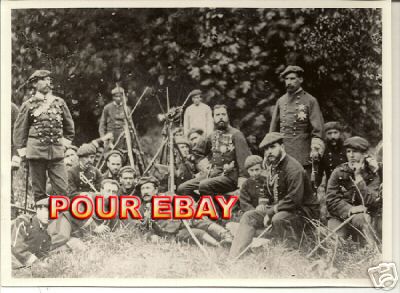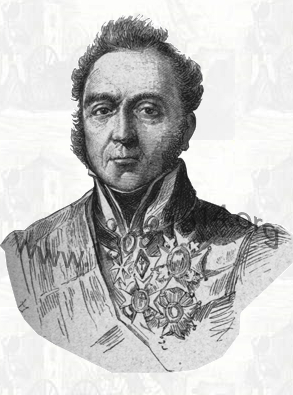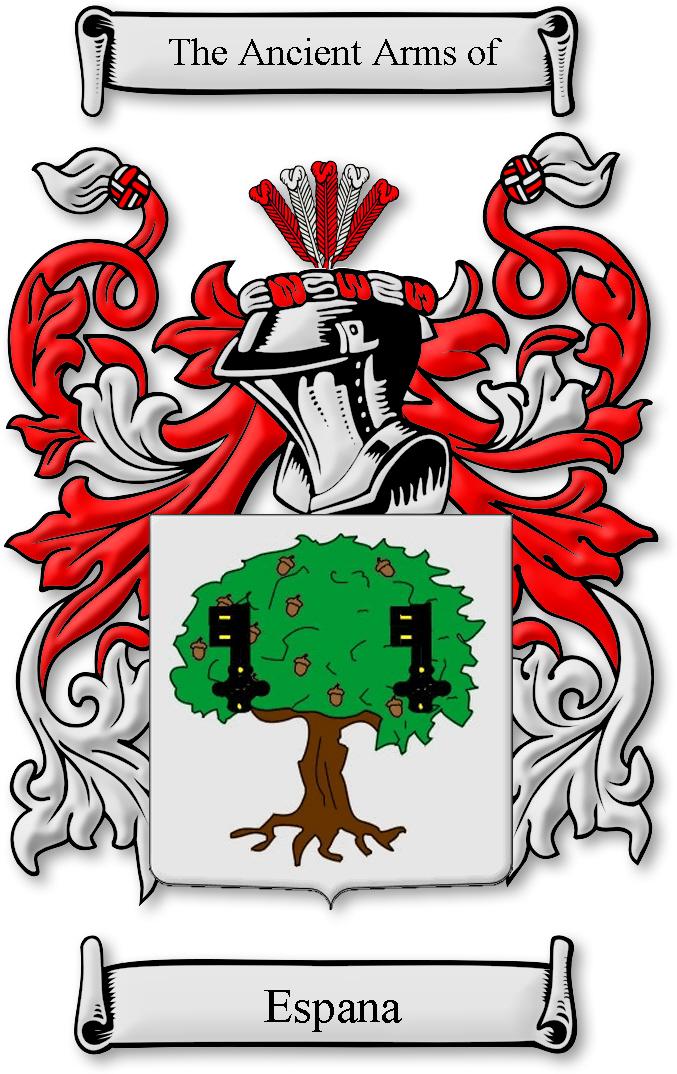Enrique d'Espagne, knowing that King Louis XVI was imprisoned, offered, along with their three children, in exchange for the freedom of the King. La petición le fue denegada. The request was denied. Esto supuso que la familia Espagne tuviera que emigrar, pues peligraban sus cuellos. This meant that the family had to emigrate Espagne because their necks in danger. El marqués con sus hijos emigró a Alemania entrando en el llamado Ejército de los Príncipes, siendo destinado el joven Carlos a la Compañía de Nobles Mosqueteros, en la Brigada que mandaba su padre. The marquis with their children emigrated to Germany entering the Army called Princes, being destined to the young Charles Noble Company of Musketeers, in the brigade commanded by his father.
Carlos José Enrique d'Espagne, Courserans of Comminges, Foix, Cabalby, d'Espras, Orbesan and Dupac, was the youngest son of the Marquis d'Espagne Enrique Bernardo. Nació el 15 de agosto del 1775 en el castillo de Remefort (Ariége). He was born on August 15, 1775 at Castle Remefort (Ariege). En su casa paterna se formó en instrucción y cultura. In his father's house was formed in education and culture. En 1791 el castillo fue asaltado por los revolucionarios. In 1791 the castle was assaulted by the revolutionaries.
Dissolved Army Princes, moved from Holland to England and, while the Marquis was heading to Spain to enter the service of Charles IV, the three brothers Andrew and Carlos Arnaldo Regiment served in the French Royal Emigrants with which made the campaign of 1793. Poco después el marqués los llamó a España. Shortly after the Marquis called to Spain. Arnaldo no quiso dejar Inglaterra, y formó parte del Cuerpo de emigrados franceses que en 1795 desembarcó en Quiberón y en aquella infausta jornada murió. Arnaldo not want to leave England, and was part of the Body of French emigrants landed at Quiberon in 1795 and died on that fateful day. Mientras esto ocurría, Carlos con su padre y su hermano Andrés hicieron la guerra del Rosellón contra la república francesa, siendo el marqués Coronel agregado de la Legión Real, Cuerpo de emigrados franceses, y los dos hijos tenientes del mismo regimiento, que luego fue batallón de la Reina. While this was happening, Carlos with his father and his brother Andrew made the war against France Roussillon, being the aggregate Colonel Marquis Legion Royal Corps French emigrants, and the two children of the same regiment lieutenant, later battalion Queen. Al firmarse la paz, Carlos fue nombrado Capitán en el regimiento de Borbón donde estaban los emigrados franceses, y su hermano pasó al regimiento de Caballería. With the signing of peace, Charles was named captain in the regiment of Bourbon where were the French emigrants, and his brother went to Cavalry Regiment. Habiendo sido trasladado el regimiento de Borbón a Mallorca, Carlos d'Espagne casó la aristócrata doña Dionisia Rossiñol, de Desplá y Comellas. Having been transferred to the regiment of Bourbon Mallorca, Carlos d'Espagne aristocrat married Dona Dionisia Rossiñol of Desplá and Comellas.

For his performance in the actions of Barba de Puerco, Alcántara and Puerto Banos, rose to colonel in 1810, after the Battle of Tamames and attacks Fresno, Medina del Campo, Alba de Tormes, Pico door and ascended Caceres to brigadier. Al frente de su brigada estuvo en la acción de Trujillo, asistió al combate de la Roca, asaltó la Alcoleta, participó en la acción de Abrantes y fue herido en el asalto de Badajoz. Leading his brigade was in action in Montreal, attended the battle of the Rock, the Alcoleta assaulted, participated in the action of Abrantes and was wounded in the assault of Badajoz. Estuvo luego en la acción de Evora y en la famosa batalla de Albuera recibió una lanzada. He was then in the action of Evora and in the famous battle of Albuera received a lance. En recompensa de sus méritos le fue concedida la faja de Mariscal de Campo. In reward of merit was awarded the Gaza Field Marshal.
En 1814 mandaba la División española que entró en Francia, batiéndose todavía contra los franceses en la acción de Bayona. In 1814 commanded the Spanish Division came into France, fighting against the French still in action Bayonne. Durante la guerra de la Independencia, al ser recuperado Madrid por los españoles, fue Comandante General y jefe político de dicha provincia. During the War of Independence, to be recovered by the Spanish Madrid, was commanding general and political leader of the province. En 1815 pasó destinado a mandar una división que debía intervenir en Francia durante el período conocido por los Cien días pero, la victoria de los aliados en Waterloo, hizo innecesaria su actuación. In 1815 passed intended to send a division that should intervene in France during the Hundred known for days, but the Allied victory at Waterloo, did her performance unnecessary. Comandante general de Tarragona antes de recibir dicho mando, volvió al mismo destino cuando los temores de restauración del Imperio en Francia quedaron disipados. General Commander of Tarragona before receiving this command, returned to the same fate as the restoration of the Empire fears were dispelled in France.
En 1818 fue segundo cabo en la Capitanía General de Cataluña de cuyo cargo fue depuesto al triunfar la revolución constitucionalista iniciada por Riego en Cabezas de San Juan. In 1818 he was second place in the Captaincy General of Catalonia whose office was deposed by winning the constitutionalist revolution initiated by Irrigation Cabezas de San Juan. La regencia de Urgell, teniendo en cuenta que en 1815 había ascendido a teniente general y en 1818 le había conferido Fernando VII el título de Conde de España, y conociendo su fidelidad inquebrantable al Rey, sus convicciones antiliberales y su capacidad militar, le nombró Virrey de Navarra, tomando el mando de las tropas de vanguardia de la expedición franco-española del duque de Angulema en 1823. The regency of Urgell, considering that in 1815 was promoted to lieutenant general in 1818 and Fernando VII had conferred the title of Count of Spain, and knowing his unwavering loyalty to the King, his convictions illiberal and its military capacity, was appointed Viceroy Navarre, taking command of the vanguard troops of Franco-Spanish expedition of the Duke of Angouleme in 1823. Triunfante el régimen absoluto de Fernando VII, fue en 1824 nombrado Capitán General de Aragón. Triumphant absolute regime of Ferdinand VII, in 1824 was named Captain General of Aragon. En 1825 reprimió la sublevación del general Bessières, cumplimentando rigurosamente las órdenes recibidas de Madrid, y en ese mismo año fue nombrado comandante de la Guardia Real de Infantería. In 1825 suppressed the revolt of General Bessières, carefully filling orders received from Madrid, and that same year he was appointed commander of the Royal Guard Infantry.
En 1827 pasó a Cataluña con el cargo de Capitán general. In 1827, Catalonia became the office of Captain General. El Conde de España, fiel siempre a los deberes de su cargo ya las órdenes recibidas, desplegó el mismo rigor contra los realistas puros que contra los liberales. The Count of Spain, always faithful to the duties of his office and orders, deployed the same rigor against pure royalists against liberals. En esa época, sobre la severidad del Conde, llegó a escribirse: “La historia culpa al Conde de España; nosotros aseguramos que fue sólo el instrumento tan obediente como sumiso, tan rígido como militar, y militar de otro siglo” . At that time, the severity of the Earl, came to be written: "The story blames the Count of Spain, we ensure that the instrument was just as obedient as submissive as rigid as military, and military of another century." Fue destituido de su cargo de Capitán General de Cataluña el 11 de diciembre del 1832. He was dismissed from his position as Captain General of Catalonia on December 11, 1832.
The Board of Berga Carlista began talks with him to be adscribiera Carlism. Los primeros contactos se produjeron en el 1835. The first contacts took place in 1835. El Conde tenía que entrar por la frontera franco-catalana. The Count had to enter the French-Catalan. Inesperadamente se dejó detener por los gendarmes. Stop unexpectedly stopped by the gendarmes. De allí fue trasladado a Lille. From there he was transferred to Lille. Permaneció confinado en esta Ciudadela hasta que pudo salir fingiendo estar enfermo y loco. He remained confined in this citadel until he could get out pretending to be sick and crazy. El 4 de julio del 1838 ya estaba en Cataluña, donde ocupó el cargo de Capitán General del ejército carlista. On July 4, 1838 and was in Catalonia, where he served as Captain General Carlist army. A parte de su vertiente militar, durante la guerra de los siete años, el Conde de España posibilitó la creación de la Universidad Carlista de San Pedro de la Portella. Besides military side, during the Seven Years' War, Count of Spain enabled the creation of the University of San Pedro Carlista the Portella. Con el tiempo la Junta de Berga consideró que se había excedido en crueldad, sobre todo en Olvan, Gironella y Berga. Over time the Board considered Berga had exceeded cruelty, especially in Olvan, Gironella and Berga. Esto provocó su detención y destitución. This led to his arrest and dismissal. Un rápido juicio ordenó su ejecución. A quick trial ordered his execution. Sus mismos compañeros lo estrangularon y lo lanzaron al río Segre. Even his fellow strangled and threw him into the river Segre. Su asesinato se produjo en Coll de Nargó el 2 de noviembre del 1839. His murder occurred in Coll de Nargó the November 2, 1839.
Resulta ser que, por el año 1840, María Roset, hija de un médico y catedrático de la Universidad de Cervera (Lérida), que a la sazón fue amigo del conde de España, su hermano José Roset, el señor Caba, un pariente de éstos, y dos sirvientes, decidieron ir a la feria de Orgañá. It turns out that, by the year 1840, Mary Roset, daughter of a doctor and professor at the University of Cervera (Lleida), which at the time was a friend of the Earl of Spain, his brother Joseph Roset, Mr. Caba, a relative of these, and two servants, decided to go to the fair Orgañá. Al pasar por el Coll de Nargó, uno de los criados les mostró el lugar donde había sido muerto el conde de España y su tumba. Passing the Coll de Nargó, one of the servants showed them the place where he was killed the Earl of Spain and his tomb. José Roset, que era médico como su padre, deseó tener un recuerdo del que fuera gran amigo de su padre. José Roset, a doctor like his father, wanted to have a memory of the late great friend of his father. Según parece, ayudado por sus compañeros de viaje, abrieron la tumba del conde, cogió el cráneo, lo puso dentro de una bolsa y se marcharon. Apparently, aided by his fellow travelers, opened the tomb of the count, took the skull, put it in a bag and left.
The Roset, shortly after committing the theft of the head, were surprised by a gang of thieves. Durante ocho días permanecieron en manos de estos criminales, sin que nadie los reclamara. For eight days they remained in the hands of these criminals, with no one to claim it. Los cautivos consiguieron huir y regresaron a Igualada, su ciudad natal, con la testa del conde de España. The captives escaped and returned to Igualada, his hometown, with the head of the Earl of Spain. José Roset deseaba hacer un estudio frenológico del cráneo. Joseph wanted to do a study Roset phrenological skull. Años después marchó a las Filipinas y, según cuentan, la cabeza del conde viajó con él. Years later he went to the Philippines and, they say, the head of the count traveled with him. Alguna enfermedad tropical acabó con la vida del médico. Some tropical disease killed the doctor. Malas lenguas opinaban que la maldición del conde había matado al insigne doctor. Gossips believed that the curse of Count killed the famous doctor. En carta testamental, José Roset legó a su hermana Antonia, todos sus bienes. In letter testamental Jose Roset bequeathed to his sister Antonia, all his possessions. Así pues, hizo traer desde las Filipinas muebles, joyas, efectos personales y el cráneo, de nuevo, a Igualada. So he brought from the Philippines furniture, jewelry, personal effects and skull, again, to Igualada.
Antonia Roset deposited the skull in a niche of the church of St. Augustine, where he established the Congregation of the Good Death. ¡Que nombre tan adecuado para nuestra historia! That name so appropriate for our story! Antonia Roset, al morir, dejó como herederos del cráneo a éstos religiosos. Antonia Roset, dying, left as heirs to these religious skull.
En el año 1858 los familiares del conde de España, que residían en Mallorca obtuvieron, por Real Orden firmada el 25 de noviembre, permiso para exhumar los restos mortales del conde y trasladarlos a Defla. In 1858 the family of the Earl of Spain, residing in Mallorca obtained, by Royal Order signed on November 25, permission to exhume the remains of the count and move to Defla. En junio de 1859 se realizó el traslado de los restos sin la testa, pues aún estaba depositada en la iglesia de San Agustín de Igualada. In June 1859 it moved the remains without the head, it was still deposited in the church of San Agustin de Igualada.
The Rev. Pinós, he could see the head in the church of St. Augustine describes it: "They look at the many figures, outlines and some inscription, as stated by Ms. Maria ... and on the inside of the organ of hearing are written "C. de E.”, que seguramente debió poner el médico. E. "which surely must put the doctor. El cráneo ofrece la circunstancia de tener la parte posterior, o sea el hueso occipital mucho más abultado que el de los demás cráneos y que la generalidad de los hombres”. The skull provides the circumstance of having the back, or occipital bone much bulkier than the other skulls and that the generality of men. "
José de España, nieto del Conde, mandó a Juan Jaume Reus, para que certificara la autenticidad de la testa y la devolviera a Defla. Joseph of Spain, grandson of Count, sent John James Reus, to certify the authenticity of the head and returned to Defla. La testa llegó a Mallorca el 30 de mayo de 1885. The head came to Mallorca on May 30, 1885. Con la solemnidad que el hecho merecía, fue incorporada a los otros restos del conde de España. With the solemnity that the fact deserved, was incorporated into the other remains of the Count of Spain.

CARLOS, THE CATALONIAN TIGER
After the first face mutilation
Carlist Rebels
O'Mighty creator of my soul, you
Brought me to naught -
Heart pierced and dripping blood
Where evil man has slaughtered,
Killed, no chance to live, for the
Battle fought was by the maddened,
The perverted from darkest hell.
Yet I live and I shall avenge the destruction
Cast upon the beloved of my heart.
How dare they come and torture, mutilate
And slay the innocent, the aged, the mother,
The child. Now I come with vengance, hatred
And fuel to burn, to char to ashes,
Mine enemies of evil!
O' dear king; let me lead the battle
To protect our causeand to cleanse
The earth of sotten souls who spread
the dearth upon the land. To avenge
The slaughter of my heart so that my
Days end shalt be in pride as I face
Them in the peaceful land!
by Dolores Marlena
(your father was my grandfather)


Carlos, being the son of Enrique (Henri) Bernardo Espagne or Espana was known for his brutality by his enemies and a great pride to his followers and the king. He became maddened with rage upon learning of the slaughter of his family while he was gone by the French Revoluntionaries. is grandfather who had taken him fo walks as a child and had been his pride of childhood had been tortured, mutilated and guillitined while the women were decimated by torture as the little children. Carlos never got over the pain and rage. His death was caused by a guard who betrayed him at the age of 65 (I think). While blinded from one of his battles you can see in the above picture he had been pretty well scarred. Even in death his body found no peace until years later his grandson was able to collect all body parts and have a proper burial in Palma de Mallorca. The family had moved their after the French slaughter of family and destruction of their ancient castle.
 | ||||||
 | ||||||
 | ||||||
The ESPANA coat of arms